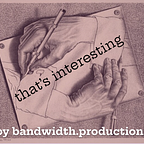017_ Conversation: from papyrus to bits, confidence in success is the harbinger of failure
This is an excerpt from the audio introduction of the podcast _bandwidth: coast to coast
Why hello, trust that this audio finds you either gripping with the end of the year, or exuberant with it’s passing. Either those or another, thank you for letting _bandwidth: coast to coast invade your auditory cortex.
We are, fundamentally, the same beings as we were in ancient times.
I was just talking with a friend of mine about the most recent Pompeii discoveries, and the conversation quickly landed at how we are essentially the same beings as then, only our technology and some of our culture has changed.
I would extend, that with technology came an influence into our culture, which then influenced back the prominence or course of that technology had on our culture, so on and so forth. From either sacking of cities or the increased comfort or size of a luxury elite, or in the way in which I would posit technology has been most influential, that being an increase and disbursement of widespread luxury goods.
But the problem, insofar as I see it, is we haven’t transcended our base human traps. At least not collectively, at least not for a sustained enough period of time to influence the course of our species to land at a new plateau, thus escaping these seemingly inevitable traps.
I really like how my guest puts it. He said when we find ourselves at another nexus point of success, is when we are most likely to become victims of it. Or more directly how he put it, confidence in success is the harbinger of failure.
Confidence in success is the harbinger of failure.
For certainly alone leaves you blind, to say nothing of another point made, when reaching a “success”, what and why you were fighting are lost. And the struggle to get there gives way to such relief when it’s over, that resting on those laurels is so tantalizing a thought, it becomes the aim.
Or to steal from episode 008 again, in response to my that humans are comfort obsessed beings; generational historian Felipe Fernandez-Armesto responds with something I think about daily,
“Comfort is the enemy of well-being.”
With that comfort we find ourselves in, it sparks many a movement towards conservatism, to maintain the status quo. But again to highlight a point my guest makes, an effort to be more conservative leads to many radical things.
And how frequently, it’s a rediscovery of the past in an effort to preserve it, that leads to an upset of that status quo. Hold onto that thought, because it’s something I already planned on expanding upon well before I talked with my guest for this episode.
If you couldn’t deduce from the pod thus far, I thoroughly enjoy the art of conversation. How the way one thinks, what occurs in their thoughts and how that plays back and forth with those you’re conversing with.
This episode, was a wildly fast and generative conversation that I’ve listened to several times over and found new nuggets of gold each pass. So much of it, that I struggled for weeks with what to highlight in this message.
Instead, I’m going to frame it this way.
Us as a species, frequently find ourselves to be trapped by the comforts and successes we achieve, in order to then have them collapse into our selves and our societies, radically and chaotically transforming them.
And that this trap, whether it’s the Gaulic people on the boarders of the Roman empire, or the global world touched by American culture, it’s as old as time.
We can fight it as an act of conservatism, but it’s likely to lead us to very radical ends nonetheless.
Where the likely best course of action, is to not stop progressing if you will, to not rest on your laurels but recognize that everything is in a constant state of needing improvement and effort.
Let me posit a quote from Wilhem von Humboldt, that my guest from episode 2, Rowan Hardin Price, recently sent to me;
“As soon as one stops searching for knowledge, or if one imagines that it need not be creatively sought in the depths of the human spirit but can be assembled extensively by collecting and classifying facts, everything is irrevocably and forever lost.” Whelim von Humboldt
Now that I’ve given this all an overly through framing; my guest for this episode is Philip Parker, historian and of History of World Trade in Maps, The Empire Stops Here as well as many others.
Without further delay, my conversation with Philip Parker. Hope you enjoy.
-J.R.
This was an excerpt from the intro essay to _bandwidth: coast to coast. If you’d like to learn more, or tune into an episode, follow this link to find it streaming on your platform of choice.
